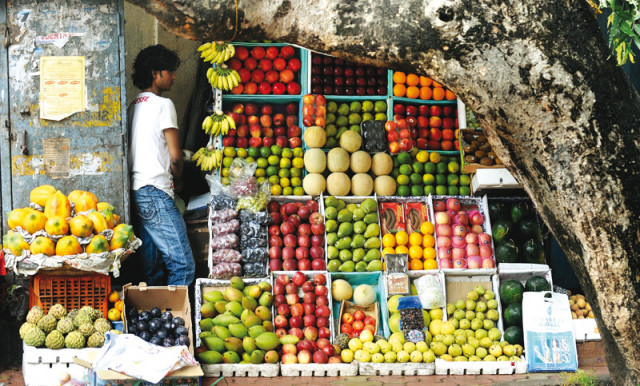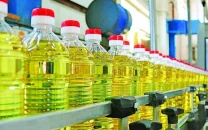Inflation hits 14-month high, reads at 4.02%
Spike in prices sees CPI rising for fifth successive month

PHOTO: AFP
Prices of essential commodities saw a sudden spike last month, as the key inflation indicator jumped over 4% in February - the highest level in 14 months - reported the Pakistan Bureau of Statistics on Tuesday.
Inflation, which is measured by the Consumer Price Index (CPI) - the indicator that captures prices of 481 commodities every month in urban centres - rose 4.02% in February on a year-on-year basis, said the national data-collecting agency. It was the fifth successive month when the headline inflation indicator has risen, as the low base effect has now kicked in.
With decline in oil prices, consumers expect low inflation
However, this time the increase was sharp compared to the three previous months. In January, the CPI had clocked in at 3.3%, which within a month rose above 4%.
In its last announcement of December 2015, the Monetary Policy Committee (MPC) of State Bank of Pakistan had kept the policy rate unchanged at 6% on expectations of a benign inflationary environment. Surging inflation, however, might result in a marginal increase in the discount rate or the SBP maintaining a status quo, said independent economists.
The central bank believes the inflation trend is not alarming.
Average Inflation
However, the central bank’s projections of average inflation in the current fiscal year appear conservative when compared with the International Monetary Fund (IMF) estimates. The SBP expects average inflation in the current fiscal year 2015-16 to remain in the range of 3 to 4%. It said that global oil price trends and excess domestic food stocks of wheat, rice, and sugar may exert downward pressures on inflation.
The headline consumer price inflation has begun to rise as the effects of past declines in commodity prices fade, and will likely reach around 4.5% by the end of fiscal year 2015-16, a February 4 statement of the IMF reads.
The IMF expected that the central bank would continue its ‘prudent monetary policy’ aimed at anchoring inflation.
The PBS monthly bulletin showed that the average CPI-based inflation rate in July-February period also slightly picked to 2.5%. It will not affect the overall inflation target of 6%, as reinforced in the latest monetary policy statement. Contrary to upward adjustment in CPI-based inflation, the Wholesale Price Index (WPI) again remained negative. The WPI-based rate of inflation contracted 1.7% in July-February period over the same time of the previous year, said the PBS.
With decline in oil prices, consumers expect low inflation
For the fourth successive month, non-food non-energy inflation, commonly known as core inflation, further increased to 4.5% in February over the same month of the previous year, according to the PBS.
The core inflation had been recorded at 3.4% in October and after that, it has been gradually ticking up, indicating that underlying inflationary pressure has started building up.
Reason behind rise
The main reason behind surge in inflation was the government’s decision to increase regulatory duties on 350 items besides imposing additional 1% customs duty on thousands of imported items. Importers have started passing on the impact of taxes to the consumers.
However, due to overall slump in commodity prices, inflation would remain within reasonable limits and below the official target of 6%, said experts.
According to the PBS, prices of food and non-alcoholic beverage group increased to 2.47% in February over a year ago. The prices of sugar went up further in February despite bulk stocks, highlighting the impact of the government’s decision to encourage exports of the commodity. The sugar prices increase 14.7% in February.
The food group has over one-third weight in CPI basket and any change in price trends has an effect on overall prices.
Inflation slows down to 1.7%, lowest since 2003
Unlike previous months, the prices of perishable food items increased 2.8% on a year-on-year basis in February, according to the PBS.
Onion prices increased 77%, followed by 53% increase in gram pulse. There was also upward trend in prices of garments, tailoring and education.
Published in The Express Tribune, March 2nd, 2016.
Like Business on Facebook, follow @TribuneBiz on Twitter to stay informed and join in the conversation.



















COMMENTS
Comments are moderated and generally will be posted if they are on-topic and not abusive.
For more information, please see our Comments FAQ